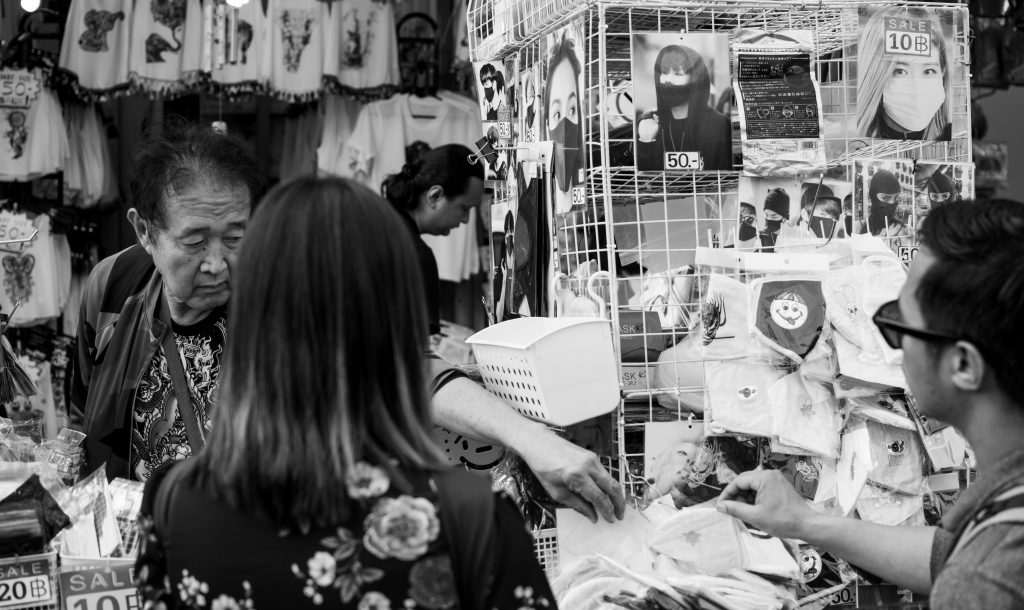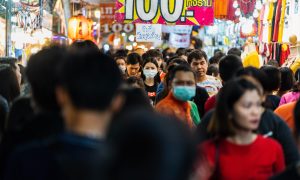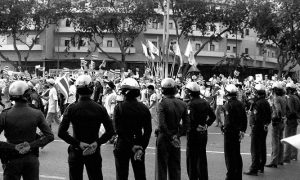Soldiers, the Thai saying goes, are the fence of the nation (rua khong chaat). But lately, that fence hasn’t been so secure. The King, in turn, is the heart of the Thai nation (soon ruam jai thai thang chaat). Lately also, the heart transplant as we transition between reigns has not been a smooth operation. The people—well, I can’t think of a nice Thai saying about them—have been getting hungrier for justice. This essay explores three interrelated political phenomena that have taken a turn for the worse under the COVID-19 pandemic: the military-led government’s incompetence, the King’s absence from duty, and the rise of mob justice known in slang as ‘the tour group descends’ (tour long).
One security breach after another
Only two months before the COVID-19 crisis settled in, a non-commissioned officer in Korat broke ranks in the worst possible way: revenge killing his commander, murdering a conscript to get into the weapons storehouse, then driving a military vehicle into town before killing dozens and injuring more than fifty people. With the military’s image already tarnished, the COVID-19 virus is now further exposing Thailand’s “fence” for its dysfunction in ensuring public safety and security.
The beginning of April saw an overnight change in virus containment policy, from the self-isolation of foreign arrivals at home for 14 days to small group quarantine in an at-the-time undisclosed location (hint: it’s a military town). Confusion over the details of procedures ensued. Long waits and a lack of clear communication at Suvarnabhumi Airport led some passengers to refuse to follow the sudden orders. The standoff ended in the release of almost all passengers from five separate flights without having to go through state quarantine. A major general stepped in to diffuse the situation, letting the passengers go home but telling them to keep their mouths shut (the major general later explained that he was following the order of the director of emergency operations at the Ministry of Public Health).
News broke that the passengers had apparently threatened to form a mob to force the government to release them. Those on the loose collectively became the public enemy du jour. The authorities leaked to the press their names, addresses, and passport numbers. Families were bombarded with insults on the phone and police visits on the doorstep. The Ministry of Defence ordered the 152 ‘missing’ passengers to report themselves to emergency centres before 6pm.
The cow’s gone missing; the fences go up (wua haay lom khok), the Thai saying goes. Yet many of the passengers would probably have agreed to quarantine had procedures been made clear to them and information not been withheld.

Security units on patrol the first night of the coronavirus curfew in Korat, Thailand, 3 April 2020. Photo: Korat Next Step
Among the feeding frenzy of criticism on social media, royalist vanguard His Serene Highness Prince Chulcherm Yugala’s comments are the most cutting:
I think that those tourists who came back to Thailand this time around must all be rich, not to mention backed by military generals who sought their release for self-isolation at home. This made it awkward for the lower-ranked officers on duty that day who couldn’t have a say in anything and had to let them go as told by the major general. (As opposed to saying “as ordered” which might be an exaggeration.) But how and why did that major general get the idea to allow them to go quarantine at home? It is my belief that only five percent will do as told. As for the rest, rest assured they won’t quarantine, increasing the risk of COVID-19 spreading to the point where it may get out of hand.
Dear Sir Maj. Gen. no name, if our country’s military has a general with such (low) intelligence who abuses his power and goes against government decree, that totally explains where the opposition got it in their head to ask “the military—what is it good for?”
In an astonishing turn of events, the Prince turned a phrase he has vehemently rejected for years: “The military—what is it good for?” With this rhetorical question, a middling royal scolded a middling military man for not being strict enough with measures to fend off the coronavirus. Might not be too far-fetched to suspect that the Prince might have also asymptomatically caught its corollary: “The monarch—what is he good for?” (To see the conversation around this rhetorical question on Twitter, go to #กษัตริย์มีไว้ทำไม)
An absent heart
Many Thai citizens were left stranded overseas by the abrupt decision of the Thai government on 3 April to bar all incoming international flights from 4-6 April, with the ban extended on equally short notice on 6 April until 18 April (and again to the end of May). But one short-tempered despot has been able to flout the restrictions.
On April 6—which happens to be Chakri Day, a commemoration of Rama I’s founding of the dynasty in 1782—King Vajiralongkorn and his short-haired entourage flew from Munich to Bangkok, bypassing all Thai security measures. Less than 24 hours later, they took off again from Suvarnabhumi, going absent without leave yet again.
What is it like for the body politic to be missing its monarch? The ongoing proliferation of military metaphors around the pandemic led me back to a chapter of Thai literature I was taught in high school. Called คัมภีร์ฉันทศาสตร์ แพทยศาสตร์สงเคราะห์, it’s an introduction to Thai ethnomedicine and medical ethics in verse as compiled by court physicians around the turn of the 20th century. The beginning of the excerpt compares the sick body to a city under siege:
อนึ่งจะกล่าวสอน กายนครมีมากหลาย
Now, on to the teachings: there are numerous bodily cities
ประเทียบเปรียบในกาย ทุกหญิงชายในโลกา
As they exist within every woman and man in the world
ดวงจิต*คือกระษัตริย์ ผ่านสมบัติอันโอฬาร์
The heart* is the monarch sitting on vast fortunes
ข้าศึกคือโรคา เกิดเข่นฆ่าในกายเรา
The foe is the infection laying waste to the insides of our body
เปรียบแพทย์คือทหาร อันชำนาญรู้ลำเนา
The doctor is the soldier well versed in the terrain
ข้าศึกมาอย่าใจเบา ห้อมล้อมรอบทุกทิศา
Once the foe comes, don’t take it lightly: contain it every which way
ให้ดำรงกระษัตริย์ไว้ คือดวงใจให้เร่งยา
Preserve the monarch: that is, rush to save the heart with medicine
อนึ่งห้ามอย่าโกรธา ข้าศึกมาจะอันตราย
Also, restrain from anger, as it will spell danger when the foe comes
*Different commentators gloss duang jit as either ‘the mind’ or ‘the heart’. While I think ‘the heart’ is more in line with the extended analogy to the physical body, it could be a little bit of both. Both words contain corporeal and spiritual dimensions: brain and soul, heart and courage. The monarch, through this double sense, simultaneously represents a physical entity and a moral capacity. Central organs work as the body’s ruler; individuals as their own sovereign work to keep composure.
While the author of the excerpt and the time of its first appearance remain unknown, a prominent credit in the school textbook goes to King Chulalongkorn (Rama V, r. 1868-1910). Originally compiled at His Majesty’s behest, the verse presents the monarch as the most vital organ. Naturally enough, this dovetails with Rama V’s unprecedented stature as Siam’s “beloved” absolute monarch.
A century later, Thai literature curriculum planners have recontextualised the verse yet again to inculcate nostalgic nationalist-royalist values in high school students. But under the absenteeism of Rama X, children grow indifferent. His absence doesn’t make any heart grow fonder, as there’s nothing good about him to miss. Instead, Rama X’s rule is the perfect vaccine against nostalgia: it immunises us against militarism-royalism by exemplifying how terribly wrong things can go under the oft-touted legacy of “Great Kings” like Chulalongkorn and Bhumibol (Rama IX, r. 1946-2016).
Instead of a heart that sustains the body, the current monarch is a dysfunctional organ that diverts essential resources to itself and cuts itself off from others. Still, the soldier is there to preserve it. The fence’s true function has been exposed: it is not there to protect the people from danger, but to exclude them from an impenetrable domestic compound, a p(a)lace with rua rob khob chid.
A delicious form of mob justice
Living under a state of insecurity during the COVID-19 pandemic, those “on the fence” politically are increasingly willing to accept haphazard authoritarian measures and intolerant of anti-government criticism. Individual infractions of social norms in Thailand are commonly responded to with collective punishment, but a vicious ‘tour group’ mentality now manifests itself in daily feeding frenzies on social media. The slang phrase tour long [‘the tour group descends’] refers to when large numbers of the public vilify individuals viewed as a threat to public safety, exposing their identities and often personal information.
Before its current usage, tour long referred to the phenomenon of foreign—most commonly mainland Chinese—tourists packing a restaurant or a tourist destination. But under national and global lockdown there are no “unhygienic” tourists for Thai people to complain about. Now the stigma previously reserved for undocumented Thai migrant workers returning from South Korea has evolved to target Thais returning from any country. Everybody coming in from the outside is physically and morally suspect, guilty of selfish superspreading until proven otherwise.
Note that the ‘tour group’ in tour long doesn’t refer to the so-called “rich” “tourists” returning from abroad, but rather those strangers who are visiting and flooding social media profiles of the public enemy du jour. An attack of tour long diverges from general political criticism in its sheer volume and invasiveness: hundreds or even thousands participate in each attack, and they tend to go for personal insults on the person’s social media profile to shut them up. Menace is in the air, waiting for someone to say the wrong thing on social media. That’s why the phrase “beware tour long” may be used either as a humorous warning between friends or a serious threat between foes.
For Thais stranded overseas, the message being sent by both the government and the masses is loud and clear: stay out of Thailand if you can. And if you can’t—while we will grudgingly allow you to return, don’t say anything that could be construed as anti-government as no amount of grovelling and pleading your case will be enough to shield you from a nasty public attack. Some go so far as to pine for Philippine President Rodrigo Duterte’s order for police and military to “shoot to kill” citizens who defy coronavirus lockdown.
It is not surprising that tour long is going viral under national lockdown, spread by citizens with cabin fever feeding on virtual distraction. Tour long is a delicious form of mob justice where pent-up anger and resentment is unleashed by a powerful mass of powerless people. No one, not even the king, is immune. While some instances of tour long may be easily understood as effects of propaganda, the herd mentality of tour long may be enjoyed by anti-democracy and pro-democracy factions alike.
But viral vigilantism does not reinforce collective defence. On the contrary, it eats away at the solidarity and compassion needed for the survival of our social safety net, from the macro-level of public policy all the way down to micro-feelings of linked fate. In this time of extraordinary uncertainty, I know one thing for certain: a society characterised by stigma and fear, however effective they may be in public health campaigns, is not worth living in.
 Facebook
Facebook  Twitter
Twitter  Soundcloud
Soundcloud  Youtube
Youtube  Rss
Rss 


